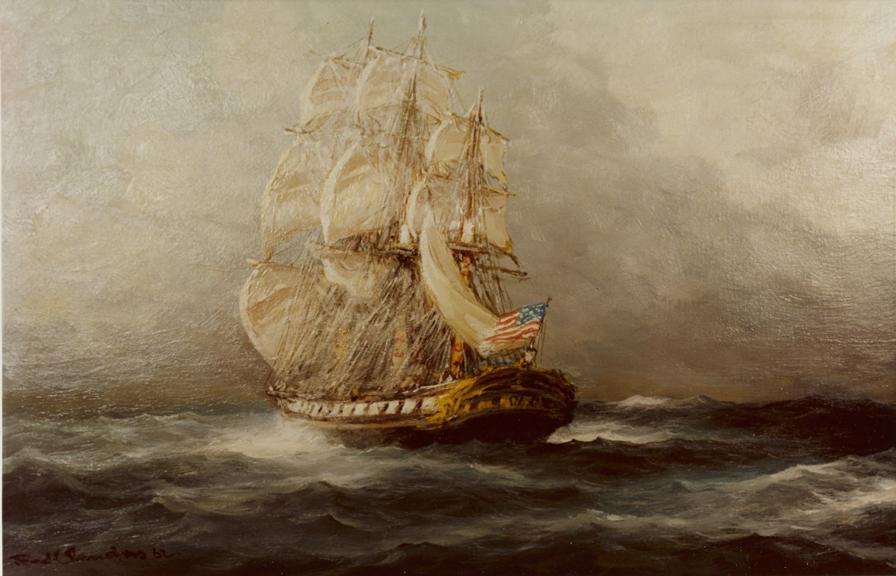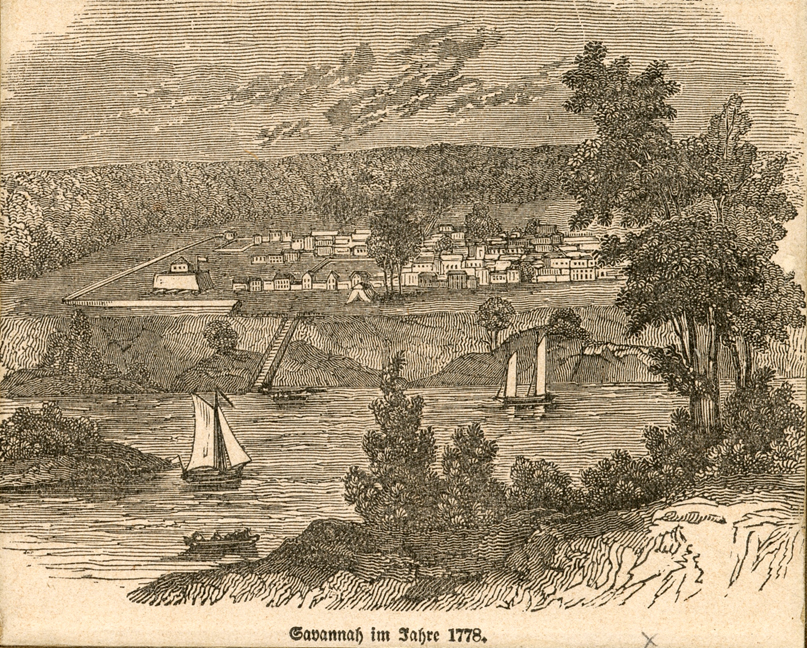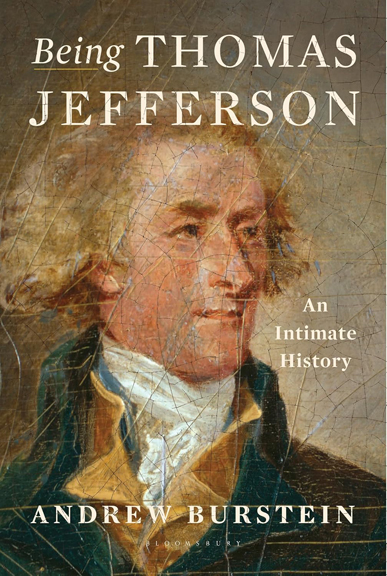
They say that history is written by the victors. Thus, the story of the American Revolution is largely one of heroic figures such as George Washington and Patrick Henry and largely-than-life episodes, such as the winter at Valley Forge or victory at Yorktown. Because America won its independence from Great Britain, rather than lost the war and reverted to some form of colonial status, the whole story seems ordained, as if it were written in the stars.
Little thought is given to how different America would be had the war turned out differently, and even less to the losers in the struggle; not the British regulars, but rather the thousands of ordinary colonists who remained loyal to the British Crown. The loyalist version of events is almost never encountered.
Which brings us to the story of two Carolina loyalists named John Dunn and Benjamin Booth. Booth and Dunn were lawyers from Salisbury, North Carolina, a modest and poor town in the remote backcountry. The two would have been entirely forgotten, but for their petitions alleging mistreatment by their Whig neighbors, who arrested and deported them from the region in the summer of 1775. In the stories of Booth and Dunn we hear the rare testimony of history’s losers.
Dunn’s troubles began in the late spring of 1775. By his own account, he was minding his own business when “a Certain William Temple Coles” approached him. Coles read out loud pro-British resolves “declaring their disapprobation to the Measures then Carrying on by the people at Boston.”[1]
The two men approved of these “Very Much” and decided to draw up similar loyalist resolves for their county. Later Coles produced “a paper Containing a Declaration of Allegiance, fidelity and obedience to his Majesty and Submission to the British Acts of Parliament.”
This was going to be a problem for them, because Rowan County, where they lived, was a hotbed of Whig sentiment. The area had been settled by Scotch-Irish Presbyterians who were anti-English from religion, conviction and historical memory. In fact, after the war Lt. Col. Banastre Tarleton called the area “more hostile to England than any other in America.”

Moreover, Dunn was a bit of a drinker and prone to shoot his mouth off in front of his neighbors. One night, at a tavern he began “arguing warmly in favor of Ministerial measures” against America. No doubt the bar went quiet as in some Western movie before someone gets beaten up. Someone present took notes of what Dunn was saying and reported them to the local Whig leaders. Dunn, it was reported, had stated that the Americans “had no right to prescribe to the Prince and Parliament!” As perhaps the last straw, Dunn had a pet dog named Tory.[2]
As relations deteriorated with England that summer, local leaders took action to have Dunn arrested. His friend Booth it appears was arrested for being friends with Dunn, and a known British sympathizer. According to Dunn he was “just recovering out of a fit of Sickness and at my own house in Salisbury … [when] a number of Armed persons Entered … [and] Seized upon my person.”[3] He was taken away under guard. A few minutes later he “saw Mr. Booth Conducted in the same manner.”
They were to be interrogated, they were told, in “Order to Examine us with regard to our Political Sentiments, with regard to the American Cause of liberty.”
That same night, they were taken under guard to nearby Charlotte. The next day, they were tried and sentenced for anti-Revolutionary fervor. Their sentence was expulsion from the community. The two were sent away to Camden, South Carolina, and thence to Charleston where they would be held for over a year. As Dunn caustically put it, their trial and sentence was in “Direct Violation of those Rights and Privileges which Americans contend with Great Britain for at this Time.”[4]
That may have been true, but there was no going home for either one of them. Anger and violence in the remote Southern backcountry would only increase over the next several years. They two men could consider themselves lucky to have gotten out alive in the summer of 1775. No doubt a few years later, the story would have had a grimmer ending.
[1] The account of the arrest of Booth and Dunn is taken largely from Volume 10 of the State and Colonial Records of North Carolina, “Memorandum from John Ross Dunn concerning his imprisonment,” July 27, 1776, pages 673-678.









6 Comments
An interesting follow up to this story – after they’d been in Charleston on parole for about a year, they were allowed to return to Salisbury to remain on parole. Boote appeared before the NC Council of Safety in Sept 1776 to take the oath of loyalty to the state. In 1780 he’d flee to Charleston after it fell to the British. Dunn, however, remained on parole in Salisbury at least through December 1776. Though the record doesn’t say anything further about him taking the oath of loyalty, the NC General Assembly in 1779 did name him one of three commissioners “to employ workmen to build a new Court House in the Town of Salisbury.” The fun part is, one of the other two commissioners was a man named Adlai Osborn, one of the local committee of safety members who, in 1775, ordered his arrest and oversaw his transfer to Camden and Charleston. That probably made for awkward water cooler conversation!
Scott Syfert, now the MecDec man! Huzza!
I am making a list of Tories known to have been punished in NW North Carolina by Benjamin Cleveland and others. A Loyalist signing himself “An Independent Refugee” in the Charleston South-Carolina Weekly Gazette for 26 July 1783 gave a long account of the “Case of the Loyalists in North Carolina: Their Exertions and Sufferings during the Rebellion.” Half a year after the British evacuation of Charleston this paper was still printing articles on the sufferings of the Loyalists, but after all not all the loyalists had fled–and the British had not yet evacuated New York City. Now, this Independent Refugee says that before Cornwallis’s invasion of North Carolina “three brothers of the name of Hartman, who lived near the town of Salisbury, were shot dead in their own houses before their wives and children”–shot dead by unnamed Whigs. Now, I have not found even one of these Hartman brothers. What makes this especially odd is that the writers seems to have been very familiar with Salisbury, if not from there. I’ve been including Tory hunting by Virginians who like North Carolinans moved back and forth across the border in the New River area. Biggest disappointment yet has been Robert O. DeMond’s LOYALISTS IN NORTH CAROLINA IN THE REVOLUTION (Duke UP 1940). DeMond says hardly a word about NW North Carolina–and adores, nay, worships the great brave humane David Fanning.
Can anyone help me with the Hartman brothers?
Interesting perspective. I am aware that in the westernmost portion of North Carolina, which during this time frame was the Watauga Settlements, and later after the siege of Fort Caswell in the summer of 1776, they became Washington District of North Carolina. The Tories were causing all kinds of trouble, from kidnappings to what have you. When it came time to sign the Oath of Allegiance to the State of North Carolina, or forfeit their land (leased from and later purchased from the Cherokee Nation), they refused. Some of them, Jacob Dykes and Jonathan Holley, among others got their breeches in a bunch and decided if the rumors that others were entering their confiscated land, that they would kill both the Entry-taker, John Carter, and the Magistrate of the District, John Sevier. This was in 1779.
Happily, Mrs. Dykes came to Sevier’s mercantile to warn him and told his first wife all about the plan made by her husband and other Tories. Suffice it to say, both Carter and Sevier were kept safe. Some time later, news arrived that one Jacob Dykes had been hanged. The rumor had it the Regulators had seen to it. When these men came to trial, Sevier put in a good word for them, and they were let go.
I’m aware this is an old thread, but I would be so grateful for any more information available on John Holley….trying to find out if there is any connection between this John Holley and John Holly from Chowan County who was married to Rebecca Gilbert. The John Holley who got into so much trouble was brought before the Salisbury Judicial District in 1779 for ‘being inimical to the common cause and pleads not guilty”. His wife’s name was Rebecca and his lands were confiscated. John Holley, Jr was found not guilty of treason. Jonathan Holley charged with treason but discharged as was Francis Holley. John Holley refused to take the Oath of Allegiance and was later jailed for a year.
Any information as to where he was born, came from, etc. greatly appreciated.
John Holley II (wife Rebecca) was from Bertie Co. and then Sampson Co., NC. He later moved to SC and then TN. His parents were John Holley I (wife Sarah Church Holley). He was born 1690, probably in Isle of Wight, VA. He died 1729 in Bertie/Chowan District, NC.
Re John Dunn and The Rest of the Story:
Your argument seems to condemn this man’s actions. I have found that hIstorical accounts seem to differ greatly as to his background and sympathies. He is always described as a Irishman and we know he showed up first in Cecil Co MD records and then in Western NC. One source states that he was a transportee who got into a scrape with Catholic clergy while a student at Trinity College in Dublin and was expelled.
While he was Irish born, he was said to be an ardent Anglican whose Salisbury home was used for church services. And since at that point in history only Anglicans were eligible to enter Trinity, that doesn’t seem to jive. Records show student by that name at Trinity around the time he would have been expected to be attending. But Dunn is a fairly common surname.
A John Dunn did sail from Waterford, Ireland to Baltimore per immigration records. And records do exist for this John Dunn for the time period he and James Carter were living with Rumseys in Bohemia Manor MD. His stay there and his military service is documented.
One author described him as an Irishman of English descent who attended Oxford. Still another said he was a self taught lawyer who lived in the backwoods of NC in Reedy Creek area before passing the bar and moving to Salisbury area. Which of these is correct?
Most biographers have portrayed Dunn in a sympathetic light and accused his political enemies as having orchestrated the described debacle. Since he went right back to work in Salisbury after his release and appears to have been well received by the citizens, it leads credence to that theory. As I recall, only a couple writers have portrayed him as you did in this article as a Tory and just short of traitorous.
Also: As I recall, the dog story occured after Dunn was imprisoned (actually confined in a boarding house or some such lodging) in Charleston. His daughter’s home was occupied by British troops during the Revolution and the family was said to have resented their treatment. This and the fact
that he vehemently denied being a Tory and complained of his treatment might better explain his sarcasm in naming the dog.
Has anyone ever clearly documented his origins and examined his sympathies? Would be very interesting to know.